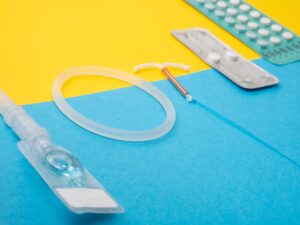Before you use birth control with fibroids, you have to consider your options. After all, uterine fibroids are non-cancerous growths that form in different parts of your uterus. And they’re classified as subserosal, intramural, or submucosal, depending on where they form.
Now, before we talk about why fibroids impact birth control choices, let’s look at some theories about why the tumors develop in the first place. Without knowing the exact cause, we know that insulin-like growth factor may trigger fibroid formation, as can ECM, or Extracellular matrix, a material that gets cells to stick together.
Also, fibroid growth can be affected by your estrogen levels, which could be why some women experience fibroid growth while they’re pregnant. Now, here lies the point of this whole post: since there’s a link between estrogen and fibroid growth, you have to be careful when you choose birth control with fibroids, so it doesn’t make your tumors larger or your symptoms worse.

If you start oral birth control when you have fibroids, here are some of the effects you can expect:
Suffering from long, heavy periods with fibroids? Then taking the pill could help, since oral birth control contains estrogen that can improve clotting and reduce menstrual flow, resulting in lighter and/or shorter periods.
Many forms of oral birth control decrease your prostaglandin count. And, since these compounds trigger the uterine contractions that cause cramps, you may experience fewer menstrual cramps and an improvement in pelvic pain.
Even as oral birth control with fibroids could improve your symptoms, they could also make your tumors bigger. You see, fibroids respond to estrogen, so an estrogen-based birth control pill could kickstart their growth! In turn, larger fibroids could see your symptoms return, even worse than before, canceling out any temporary relief you previously enjoyed.
If you have risk factors for uterine fibroids, but haven’t yet developed any tumors, taking oral birth control with a low-dose of estrogen could reduce your future risk for fibroids!
Oral birth control containing both estrogen and progesterone slightly increases your breast cancer risk. After this research went public, many women opted for progesterone-only contraception. Unfortunately, a study out of the United Kingdom suggests that this pill form can also increase your risk for breast cancer, albeit slightly.
If you prefer an IUD (intrauterine device) to oral birth control with fibroids, here’s what you need to know about this small device that your gyno implants in your uterus to block pregnancy. There are two forms of IUDs: hormonal and non-hormonal. Let’s explore how each can affect your fibroid outcomes.
Hormonal IUDs release synthetic hormones that thin out your uterine lining while thickening your cervical mucus, preventing a fertilized egg from implanting while also interrupting your ovulation process. But non-hormonal IUDs work differently. They release copper into the uterus in order to create an inflammatory reaction that creates a hostile environment for sperm.
Now, that’s how IUDs work generally, but here’s how they work when you have fibroids. Basically, they only work occasionally. Because if fibroids change the shape of your uterus, you can’t use an IUD. However, if your uterine shape is unaltered, and you want an IUD, it’s time to decide between the hormonal or non-hormonal options.
Using a hormonal IUD can relieve some fibroid symptoms—especially long and heavy periods. This could be a great option if you’re losing lots of blood each month, since it could lower your anemia risk. This form of device could also improve painful menstrual cramps and make your fibroids diagnosis more manageable. Still, there are a few reasons why you may wish to avoid a hormonal IUD.
Just as estrogen-based oral birth control could make your fibroids grow, so could a hormonal IUD. So, if you’re hoping to shrink your fibroids—not make them bigger—you may prefer to implant a non-hormonal IUD. This should help with pregnancy prevention, but won't offer fibroid symptom relief. In fact, the opposite may be true: some women heavier periods and worse cramping non-hormonal IUDs.
Also, it’s important to realize that fibroids make it more likely that your IUD could partially or fully get expelled from your uterus. As such, it may not be the most reliable form of birth control with fibroids.
There have been some scary warnings about the safety profile of hormonal IUDs. After just 5 weeks with a Mirena IUD implanted in her, a young lady named Chelsea developed debilitating anxiety, brain fog and ocular migraines. In fact, she lost her sight for up to 45 minutes at a time, sending her to the Emergency Room. Dismissing her concerns, Chelsea’s doctor suggested that said her symptoms should get better after she got used to the IUD, but she decided to get it removed right away. After she started feeling better, Chelsea shared her experience with IUD Alert to allow other women to make informed birth control decisions.
Even without scary side effects to consider, it can be tough to choose the right birth control with fibroids. For that reason, we encourage you to review all your choices with our Dallas fibroid specialists.
At the same time, we have to remind you that birth control can only target fibroid symptoms, not the growths themselves. So, if you hope to find lasting relief, we invite you to schedule a consultation with our doctors to learn more about UFE Treatment in Dallas and see if it is right for you.
Sources: Mayo Clinic

Our Locations
Monday - Friday
8am - 5pm
Dallas
3920 W Wheatland Rd,
Suite 108,
Dallas, TX 75237
Plano
5425 W. Spring Creek Parkway,
Suite 100
Plano, TX 75024
Scheduling
Please contact our dedicated specialists to schedule a consultation today.
2025 Dallas Fibroid Center. All rights reserved. Website Design by Healthcare Success